
New Protected Area Gives Anangu “our Own Voice”
A Land Rights News article
The Central Western Desert Indigenous Protected Area was a long time coming, calling for two days of celebrations.
During one of the hottest March weeks in living memory, hundreds of traditional owners and their supporters gathered at Ilpili, a significant water site in the middle of Australia’s newest IPA.
As their people had for tens of thousands of years, they came from all over the four million hectare area and beyond to perform ceremonies and introduce a new generation to their country.
They also signed an agreement with the Australian government to look after it for all Australians.
The two permanent springs seeping from Ilpili’s limestone make it an important gathering place.
The site lies between Walungurru (Kintore) and Watiyawanu (Mount Liebig), and is Papunya elder Karyn McDonald’s grandmother’s country.
“This is an important sacred place,” she said.
“Last night I was crying because I was remembering how my ancestors used to stay around this area. And it was really difficult, winter season and hot season, to look around for food. When I came here I felt my ancestors whispering to me. I felt my tears,” she said.
“We’re really proud to look after the country, the rock holes, water holes and all the animals, for the kids’ future. For them to learn from us so they can pass it on to the future generations,” Ms McDonald said.
She said feral camels pose the main threat to Ilpili’s springs.
“They just come, drink, have a bath. That’s how they are spoiling our water holes. The rock holes as well. We need to keep our country safe.”
Ms McDonald wants the Anangu Luritjiku and Walungurru ranger groups to “listen to the traditional owners” as they look after country between them, following an IPA management plan.
For the IPA management committee, getting rid of buffel grass and camels is of the utmost importance.
It’s the “main thing” for IPA committee member Patrick Collins, and why he signed up for the Australian Government funds that will flow with the IPA agreement.
“Water first, before we can come and look after country. Camels always smashing all the water. We need someone to help us. That’s why we’re trying to get someone to give us a little bit of money and work with us to look after the water and push all the camels to somewhere else.”
The celebration was the reward for all the work traditional owners and the Central Land Council started in 2017.
“We’re happy today,” Mr Collins, a CLC delegate from Watiyawanu, said after he signed the agreement.
“We’re trying to look after country. We travel around and see all the kids and get all the rangers to work with us to fix my country.”
School kids from his community spent the first morning of the gathering in the sand dunes north of Ilpili, learning how to track animals from kuyu pungu (master trackers) from Kiwirrkurra, Nyirrpi and Yuendumu.
“We want to learn the kids to carry on what we’re doing, so we’re passing story on to the kids and they can pass on the story when they grow up,” Mr Collins said.
“We’ve been learning with our grandmother and father how to catch kangaroo and goanna. We want to learn the kids to track animals, which way the animals are going, which way they are turning, see fresh tracks and old tracks. ‘Oh, we might follow fresh tracks’. So we are following the right track. ‘It must be here, where the fresh track is’.”
After a couple of hours of tracking in more than 40 degrees heat everyone retreated to whatever shade they could find.
Luritja interpreters helped the kids to relax with kuyu pungu Christine Michaels Ellis, her mum Alice Henwood and Enid Gallagher, who talked to them in Warlpiri.
“I was really happy with these kids,” Ms Michaels Ellis said.
“We asked them to recount. That’s what we always do with our rangers. They recounted back to us what they had seen today – snakes, camel tracks, fox tracks, sand goanna, scorpion burrows and centipedes, and old cat tracks as well. And they were really happy. It was really great.
“I told them tracking is really important so they can pass on the knowledge from the old people. Without the elders there will be no more tracking, so they have to pass knowledge to the young people.”
Students from across the IPA prepared for the big day by practising purlapa (ceremony) with the elders, and some carved and painted their own small digging sticks.
The rangers of tomorrow visited rock holes to learn from elders and scientists how to test the water quality and keep them clean.
“If they become a ranger they can learn their kids,” Ms Ellis Michaels said.
“If they haven’t got songlines they have to record it. That’s what Warlpiri people do at Yuendumu. They get records from the old people, and take it to PAW [Pintupi Warlpiri Anmatyerr Media], and they save it.”
With precious cultural knowledge and nine threatened animal species to protect on the IPA, the rangers have their work cut out.
Those who have to make it all happen feel up to the task.
“We’ve got the princess parrot, the (central) rock rats, and we’ve got the great desert skink in these areas, but there’s so many other more projects that we have planned,” the coordinator of the Papunya-based Anangu Luritjiku Rangers, Lynda Lechleitner, told the ABC.
“This IPA gives us our own voice and brings all the communities together in managing our land,” she beamed.
“It’s also going to make it faster to deliver our work on the ground because we are all working towards the same plan.”
The IPA program is an Australian government initiative that has helped Aboriginal people look after the unique natural and cultural values of their land since 1997.
Under the Central Western Desert IPA agreement the CLC will receive approximately $1.7 million for four years to help traditional owners and rangers to protect country and culture.
This is an article from Land Rights News July 2025. Read the full paper here.
https://www.clc.org.au/new-protected-area-gives-anangu-our-own-voice/


